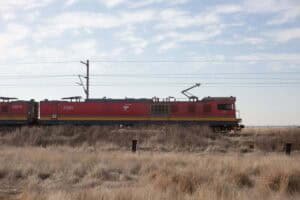South Africa needs to ‘set up more bunkering services’ to meet likely increase in demand in the coming months.

Transnet National Ports Authority (TNPA) says there has been an increase in vessels calling at Durban and Cape Town for bunkering (refuelling) services in recent weeks, though it cannot say whether this is because of vessels being diverted from the Suez Canal around the Cape.
TNPA says berthing space is being made available for this additional traffic when required. This is despite the recent backlog of vessels at several SA ports, which eased over the December holiday period.
Hundreds of vessels are being diverted from the Suez Canal around the Cape since Yemeni-based Houthis started targeting vessels linked to Israel, in protest at its military campaign against Palestinians in Gaza.
SA ship operators and service providers say they are seeing a modest increase in demand for bunker services in Durban and Cape Town, though this is likely to accelerate in the coming months, as there is no sign of the Houthis backing down in their threats to target Israel-linked vessels despite the presence of US and British warships in the area.
ALSO READ: Chaos at ports will cost the country, businesses and consumers
Houthi attacks on vessels have continued, despite a recent barrage of military strikes against it by the US and UK.
This week, UK energy group Shell said it was suspending all shipments through the Red Sea, citing fears of escalating tensions between Yemen’s armed forces and a US-backed military alliance despatched to the Red Sea to restrain Houthi attacks on shipping.
The map below from Russian military blogger Colonel Cassad shows the number of Houthi attacks (red dots) in and around the Red Sea – some of them outside Yemeni territorial waters.
Houthi attacks on commercial ships around the Red Sea

BP and shipping giant AP Moller-Maersk previously announced they would suspend transiting through the Suez Canal due to tensions in the area.
“We are seeing an increase in demand for bunker services at Durban, and while we have been able to supply them, there are concerns that supply may become on issue if we start seeing a far larger increase in traffic,” says Durand Naidoo, chair of the Institute of the Chartered Shipbrokers of SA.
“Two oil refineries that used to produce and store maritime fuel have closed down in recent years, so now we are reliant on imported fuel. For ships sailing around the Cape, scheduling is becoming more complex as they need to plan for supplies, and if SA ports are backed up – as they have been – then they will have to stop at an alternative port, such as in Mauritius.”
Rerouting from the Suez Canal around the Cape can add eight to 12 days’ sail time, and may require 35% more fuel for a vessel departing a port in South China bound for Rotterdam in the Netherlands, according to the US Naval Institute.
A Cape Town-based bunkering services operator, who asked not to be named, says he has observed a noticeable uptick in demand for bunkering in recent weeks from vessels diverted from the Suez Canal. “There’s also been an increase in calls to Mauritius, though it is struggling with capacity issues and supplies.”
ALSO READ: WATCH: Transnet suffers train derailment near Empangeni
The 2023 suspension of offshore bunkering services at Algoa Bay by the South African Revenue Service (Sars) over non-compliance with SA customs and labour laws has reduced the capacity to service ships rounding the Cape.
The three bunker operators at Algoa Bay were operating foreign-registered vessels, crewed predominantly by non-South Africans, in apparent violation of the Maritime Transport Policy.
In response to the impounding by Sars of tankers conducting offshore ship-to-ship transfers and bunker operations, the SA Association of Ship Operators and Agents (Saasoa) has called for TNPA, the issuer of bunker licences, to get together with Sars and maritime safety officials to untangle the negative impact caused by the disruption to bunkering services at Algoa Bay, and issue new licences that comply with local laws and regulations.
International bunkering services company TFG Marine advertises marine fuel supplies at Algoa Bay, Walvis Bay and off the west coast of Africa.
ALSO READ: Rail reform ‘more urgent than ever’ after Transnet CEO resigns
Bloomberg reports that Port Louis in Mauritius and ports in Namibia are becoming more popular for refuelling ships avoiding the Red Sea.
“Offshore bunkering is becoming more commonplace around the world as it is more cost and time efficient for shipping companies,” says Naidoo.
“We need to set up more bunkering services to meet the demand that we are likely to experience in the coming months. Fortunately, these services are delivered by bunker barges or ships, so it could be set up in weeks.”
This article was republished from Moneyweb. Read the original here.
Support Local Journalism
Add The Citizen as a Preferred Source on Google and follow us on Google News to see more of our trusted reporting in Google News and Top Stories.






